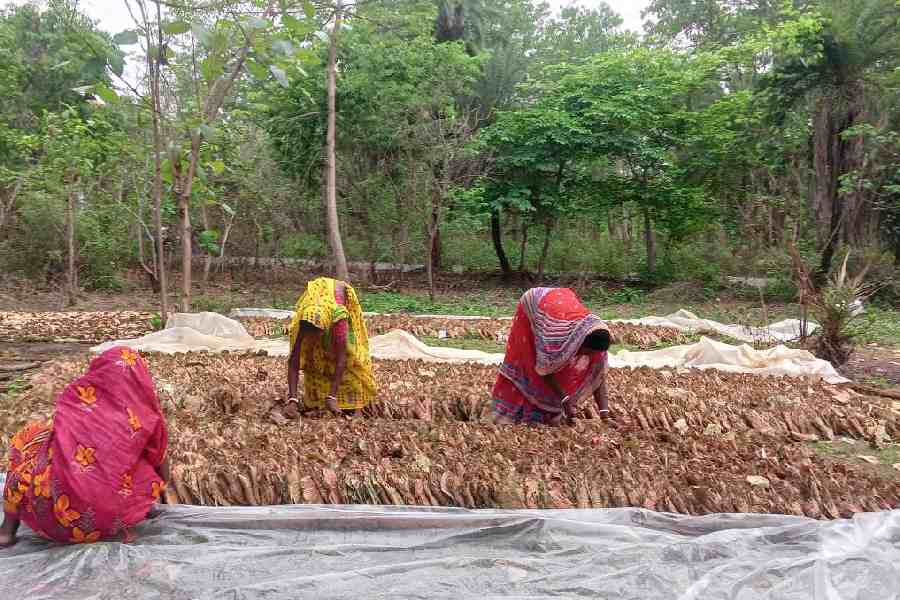Ajit Murmu, 56, along with a dozen neighbours, leaves his thatched-roof hut early in the morning and heads for the forest in the vicinity of remote Banksole village.
After toiling through the dense forest for the entire day, he returns home with as many as 2,000-2,500 kendu leaves. The next morning, he makes small bundles with 20 leaves each, arranges them in a 10x10 order, and sells them to a private buyer for Rs 100.
“It is not an easy task. You can’t go inside the forest and randomly pluck kendu leaves from any tree. You have to find clean, mature leaves of a particular size to roll beedi, and that is why it takes a day to collect 2,000 leaves. I find it hard to earn ₹3,000 a month,” said the middle-aged man in front of his house in Belpahari’s Banksole village, roughly 215km from Calcutta.
Kendu leaves are used to roll tobacco into beedis and for multiple medicinal purposes. Apart from Bengal, parts of Jharkhand and Odisha are major sources of these leaves. Beedi industries in Bengal are completely dependent on this forest product, mainly coming from the western districts of Bengal.
Murmu would have received ₹170 for the same quantity of leaves if he had the opportunity to sell them to local LAMPs (Large Area Multipurpose Societies) — a flagship scheme by the Union ministry of tribal affairs that operates as cooperative societies in tribal-infested areas. In Bengal, there are 154 LAMPs spread over 16 districts, playing pivotal roles in tribal welfare in the four districts of Purulia, Bankura, Jhargram and West Midnapore — collectively known as Jungle Mahal.
“I don’t want to sell my produce to LAMPs. They want dry leaves and would deposit the money into our bank accounts at least a week later. We are poor people and we can’t wait even three days for a payment. Yes, the private buyers give us lower prices, but they pay in cash on the spot,” added Murmu, who has been collecting leaves for the past 35 years.
He doesn’t know whether he is a registered kendu leaf collector under the West Bengal Kendu Leaves Collectors Social Security Scheme, 2015,
Like Murmu, around a hundred tribal people, including women, collect kendu leaves from the forest in villages like Banksole, Tongbheda and Bhulabeda in the Jhargram region. Many don’t even know about the social security scheme that the Bengal government runs for them.
“No one told us about such a scheme. I am hearing about it for the first time,” said Raimani Soren, a middle-aged woman and a kendu leaf collector.
A source in the West Bengal Tribal Development Co-operative Corporation Ltd (WBTDCC) said there were only 35,500 registered tribal people involved in collecting kendu leaves under the social security scheme. However, the actual number of tribal people involved in this job is outside its coverage.
A person registered with the social security scheme is entitled to benefits such as ₹50,000 as financial assistance for those registered for at least two years and who have reached 60 years of age, ₹1.5 lakh for accidental death, ₹50,000 for normal death, and many more, including medical and maternity benefits.
In 2022, the Mamata Banerjee government set a minimum support price of ₹68 per kilogram (approximately ₹170 per 2,000 leaves) and ensured that if private players didn’t accept the rate, the LAMPs would purchase the leaves directly from the collectors.
However, a senior state government official said though the government had launched the scheme with good intentions for the welfare of the poor kendu leaves collectors, the amount of procurement drastically fell for multiple reasons.
First, the welfare schemes included only tribal people, while many other communities were involved in the collection of this forest product. As a result, a large section of beneficiaries fell outside the scheme.
Second, earlier the LAMPs were allotted funds directly to their accounts, and the authorities used to pay the leaf collectors in cash once a week. In 2022, the state government decided to deposit the money directly into the bank accounts of the collectors, who were not savvy in banking. Consequently, many collectors stopped selling the leaves to the government and chose to sell them to private players at a lower rate.
Third, the government decided to purchase kendu leaves through LAMPs only from those registered under the social security scheme. A large number of tribal people remain outside the scheme, leading to a failure in selling their collections to the LAMPs.
Moreover, many LAMPs are not working actively because of a lack of an elected board to run these cooperatives.
Surendra Nath Hansda, a member of Jhargram Zilla Banadhikar Gram Sabha Morcha — a platform that works for tribal welfare to ensure their rights— said the state government should focus on bringing all those who collect kendu leaves under the social security scheme and all the LAMPs operate actively.
“Once the election is over, we will meet the administration and urge them to implement the security scheme for all those involved in kendu leaves collection as they are very poor,” said Hansda.
The BJP has accused the state government of paralysing the LAMPs by not forming elected boards, fearing defeat in the polls.
“The poor people became poorer during the 13-year tenure of the Trinamool Congress. The election in all LAMPs has been stopped, and the forests are being looted,” Suvendu Adhikari, the leader of the Opposition, said at a rally in Jhargram last week.
A Trinamool leader, however, said the tribals are with them, as they know it is Mamata Banerjee who has looked after the welfare of poor people in Jungle Mahal.
“During the Left tenure, the people did not get a proper price for kendu leaves. Our government increased the rate, which has led to private players purchasing at higher rates,” said a party leader in Bankura.










